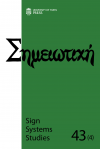The role of emotional interpretants in Peirce’s theory of belief and doubt
The role of emotional interpretants in Peirce’s theory of belief and doubt
Author(s): Jean-Marie ChevalierSubject(s): Semiotics / Semiology, Applied Linguistics, Epistemology, Semiology, Philosophy of Language
Published by: Tartu Ülikooli Kirjastus
Keywords: belief; disposition; doubt; emotional interpretant; feeling; interpretant; Charles Peirce; quale; Christoph von Sigwart
Summary/Abstract: The theory of emotional interpretant is mentioned only a few times in Peirce’s works. My hypothesis is that if Peirce did not develop this concept through and through, and reflected on it only very late in his writings, it is because it had been implicit in almost all his previous epistemological and semiotic works. Th e qualitative nature which defines belief and doubt makes the whole theory of inquiry rely on feelings, and is a consistent part of the characterization of beliefs as dispositions. In spite of this, objectivity is still preserved.
Journal: Σημειωτκή - Sign Systems Studies
- Issue Year: 43/2015
- Issue No: 4
- Page Range: 483-500
- Page Count: 18
- Language: English

